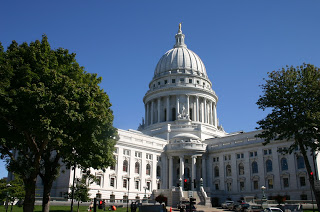Wisconsin’s primary election is an opportunity to have your voice heard on which local and national candidates you think best align with your view. This year voters also have a say in how the state decides to spend federal dollars. The primary election is on August 13, 2024, giving voters a few more weeks to get acquainted with the issues on the ballot.
The decision on how the state spends federal dollars is impacted by two, potentially confusing referendum questions on the back side of the ballot:
Question 1 – In plain language, this refers to who has the power over how federal money is spent.
A “yes” vote means the legislature would decide how federal dollars are spent.
A “no” vote means the legislature would share the power with the governor.
Question 2 – This refers to the Governor’s authority to act on behalf of the state.
A “yes” vote means the governor would be prohibited from spending federal dollars without legislative approval.
A “no” vote would allow the governor to continue spending federal money on behalf of Wisconsinites.
Much of the federal funding and state revenue that is spent in Wisconsin is allocated by the legislature and the Governor during the state budget process. Both parties try to get some form of compromise.
Funding from the federal government is often designated for a particular purpose, like road construction or broadband installations, and can only be used for those purposes.
Changes to the constitution made by these referendum amendments would apply to the Wisconsin Governor regardless of party affiliation and impact the Wisconsin legislature, regardless of which party is in the majority. However, different parties have different priorities, and finding agreement among the parties is difficult.
As an example, states have benefited from federal assistance during extensive emergencies, extreme weather conditions, natural disasters, and other situations where immediate financial assistance was critical. In more recent years, the Inflation Reduction Act and the Bipartisan Infrastructure Law allocated money to the states to implement Wisconsin’s transition to clean energy. Changing the process for how these funds are allocated could slow down the process of dispersing them.
In other words, anytime money comes to the state without strings attached on how it should be spent, it would be decided by the governor if the referendums are not approved OR it would have to be approved by the legislature if the referendums are approved.
Your vote determines the path forward for the state.

